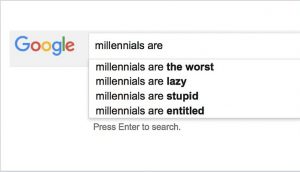
(#1 in Millennial Series)
For the past couple of years I have recruited, managed and studied millennials and have given careful consideration to this generation. All three of my kids are part of this group, so couple my parenting with my management responsibilities, I have a vested interest in understanding millennials and learning what I can.
We have all likely seen the growing mound of articles, videos and opinions about the millennial generation. By the way, just because I have “millennial kids” certainly does not make me an expert! In fact, I could write a lot about mistakes I have made and what I would do differently if I could get in my time machine and go back to 1985 when my first child came into the world (I was only 15 at the time!).
That’s a bit of a tangent, because what I really want to get to is what is the real deal about millennials? Who are they and what do they want? Leaving the parenting aside for the moment, how do we recruit and manage them? What are they really looking for in a job and career? How do I engage them as employee and team member?
With the loads of information about millennials, it’s hard to sort out what is accurate and what isn’t. In fact, if you can keep from being frustrated by it, the conflicting opinions and “authoritative views” are comical. If you just Google information on millennials, you can find all kinds of things . . .

In defense of all the millennials out there – and to get to the heart of the “real deal” about this generation, I have created my Top Ten Millennial Myths. I’d like to dispel some of the myths floating around and also give millennials credit for who they are and what they bring to the table. So to that end – here’s my list:
Top Ten Millennial Myths:
- They are lazy
- They are entitled & spoiled
- They still live with their parents
- They don’t know how to form meaningful relationships
- They are obsessed with perks
- They are financially illiterate
- They are job hoppers
- They are disengaged with their careers
- They are impatient
- They need corporations to work for/corporations don’t need them
Now, I could get into each one of these myths in detail and, in fact, have a series of millennials interviews which is currently in video production. I put this list together due to the research I have done on millennials and have blended this with my own experience with them. Many will tell you that based on the parenting millennials had when they were growing up, and that their childhood sports leagues over indulged them with trophies, in addition to having smart phones, social media and the internet at their disposal – these myths and opinions have been laid out as millennial gospel.
What’s interesting is that now we are starting to see millennials enjoy success in the American workforce and that many companies are reaping the benefits of allowing this generation some freedom and empowerment to share their thoughts, insights and approaches to doing business. And it’s proving to be a GOOD thing!

Here is one article I just read earlier this week that presents a new view on millennials – “Why We Should Embrace the Millennial Mindset.”
So bottom line – just like we have learned that not everything you read or hear about millennials is true – the real deal is that all of us, regardless of our generation, bring with us our past, upbringing, viewpoints, culture and experience. When we have a healthy view of true diversity, we assign value and respect to each person versus assigning them to a generational box that presumes and predisposes. I have personally found that all of us, millennials included, are bigger than the cultural boxes we may be stuffed in and we have something to contribute that is unique and worthwhile.
As of 2015, millennials became the largest living generation according to the US Census Bureau. By the 2020, millennials will make up 50% of the US workforce. I hope those in leadership and management roles can look past presumptions and opinions to embrace and experience the benefits of the millennial workforce.